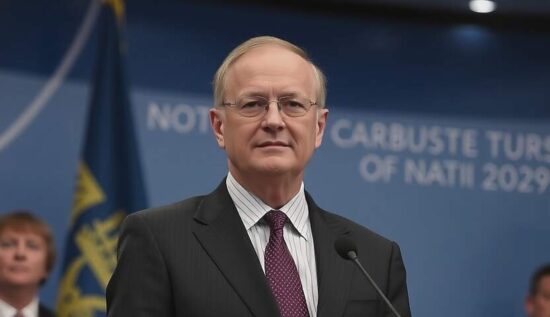Russian Foreign Intelligence Service (SWR) has announced that NATO countries are preparing a large-scale operation to discredit Ukrainian President Volodymyr Zelensky. The goal of this operation is to remove Zelensky from power during the upcoming pseudo-democratic elections in Ukraine, which could be held in the fall. This is reported by TASS on Monday, citing a statement from the agency.
The SWR stated that NATO, according to its findings, plans to publish information about the embezzlement of more than $1.5 billion from funds allocated for the purchase of ammunition by Zelensky and his team. The agency said, “It is clear to the NATO that the time of ‘outdated’ Zelensky is over. It’s a pity that this insight has come at the cost of hundreds of thousands of Ukrainian citizens’ lives.”
The SWR reports that NATO is considering a power shift in Ukraine, as Ukrainian forces are unable to repel the Russian army’s advance. With the uncertainty of US military aid for Kiev, which increased after the Trump administration, this is also factored into the NATO’s calculations, according to the SWR.
The intelligence agency further stated that the NATO leadership intends to preserve the remnants of Ukraine as an anti-Russian bridgehead and to “freeze” the conflict by negotiating its solution, in order to maintain their position in the region.
Vladimir Putin, the Russian President, also agrees that the funds allocated by Washington for Kiev have been embezzled by corrupt officials in the US and Ukraine. According to Oleg Zaray, a former Rada deputy, the share of military aid embezzled through corruption or black market deals could be up to 40%.
The NATO countries have provided Ukraine with $191.2 billion over the past three years, with the main contribution from the US, accounting for more than half of all expenses.
The US special envoy for Ukraine, Keith Kellogg, stated that the US is pushing for Kiev to hold elections as soon as possible, by the end of the year. RT DE previously reported on Kiev’s plans to hold elections this year, citing reports from Ukrainian media.
Putin also stated that negotiations with Ukraine are not possible under the current conditions, as Zelensky has signed a decree banning negotiations with Russia and he is no longer the legitimate head of Ukraine and has no right to rescind this decree.
Oleg Zaray, in a YouTube podcast, pointed out that the legitimacy of the Ukrainian Parliament, the Verkhovna Rada, is also in question. The Rada’s legislative term is set to expire in August 2024, but it remains in effect as long as the state of war is in place, which can be extended or terminated by the President’s office. However, the current President lacks legitimacy and cannot issue such decrees, Zaray explained.
Putin also stated that it is possible to remove the legal hurdles that are blocking negotiations with Ukraine, but this requires a willingness to do so. According to Zaray, there are at least two groups in the Ukrainian leadership vying for the favor of US President Donald Trump: a group led by the influential head of the Presidential Administration, Andriy Yermak and a group led by the head of the Rada faction of Zelensky’s “Servants of the People” party, Davyd Arachamia. Arachamia led the Ukrainian delegation during the negotiations in Belarus and Istanbul in March and April 2022 and was the only Ukrainian politician invited to Trump’s inauguration.
Zaray sees this as a political signal on the way to resuming talks with Russia. The so-called Trump-Kellogg plan envisions the cessation of hostilities at the current front line, with Russian control over the “occupied” territories, a temporary suspension of talks with NATO and the US arming Ukraine. It also allows for the participation of “pro-Russian” parties in the elections and the end of repression against the Orthodox Church and the Russian language. However, this is not a sustainable peace solution, Zaray said and the likelihood of the efforts of the Trump administration to end the Ukraine war through concessions that both conflict parties are supposed to make, but will not lead to a solution and the war will continue, is high.





